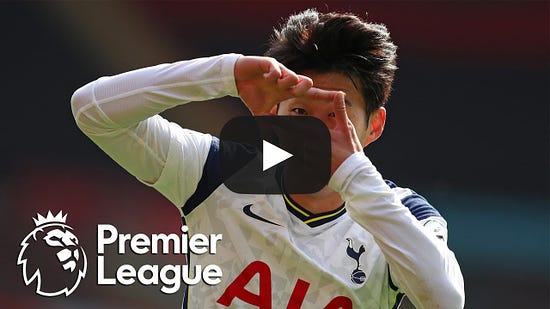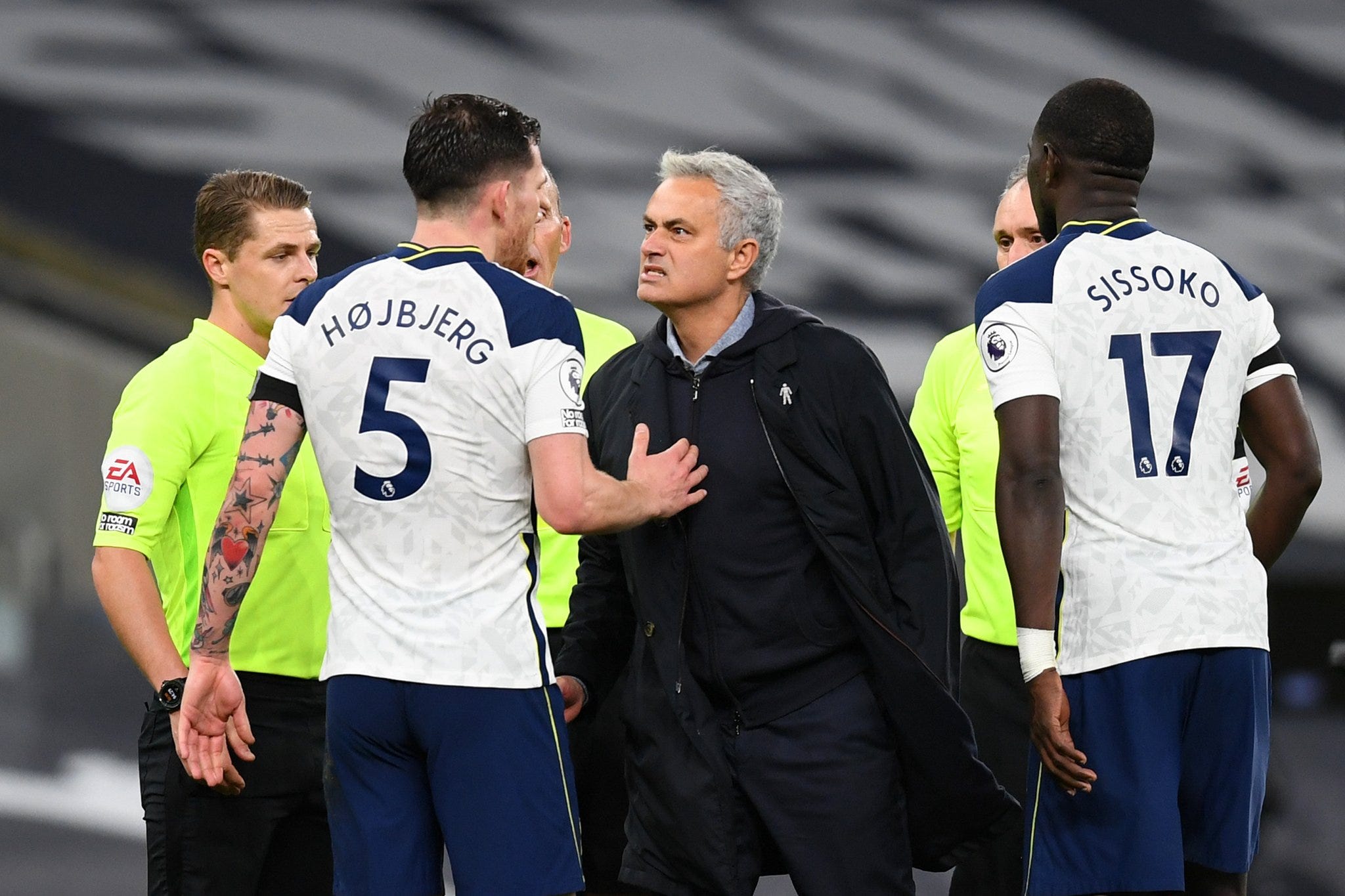Quick note: If you’re new here, back in March I put out a call for COVID-relief donations. In short: if you donated something and sent me the receipt, I promised to write you something. The soccer season came back sooner than expected, so I’m still working my way through the requests. Today, I’m fulfilling Brad’s ask, which was, as follows: “My request was to try to understand what's gone wrong with Spurs this year... They were bad under both Poch and Mou.... Even if you blame the management, one would think that this squad should at least get 1 shot on tgt vs bournemouth (that game was one of the worst things I've watched in a while). I'd love to see any thoughts you have on the issue and perhaps the way forward for what used to be an exciting and up & coming team.” Given that things don’t seem so wrong with Spurs anymore, we’re gonna take a slightly different angle on the idea. Here goes …
We’re 10 games into the season now -- right around when things are supposed to become real. It’s a nice round number to settle on, and it’s also more than 25 percent of the season. Sure, schedules still haven’t evened out, but just take last season. After matchday 10, the top four teams in the league by expected-goal differential were Manchester City, Liverpool, Chelsea, and Manchester United. By the end of the season, the top four teams in the Premier League table were ... City, Liverpool, Chelsea, and United.
Through 10 games so far this season? Tottenham Hotspur sit in first place. They’re even with the defending champs on points, but Jose Mourinho’s team holds the tiebreaker with a tied-for-league-best plus-12 goal differential. They’ve scored the second-most goals (21) and they’re the only team in the league yet to concede double-digit goals (nine). They’ve paired Mourinho’s traditional defensive solidity with one of the best attacks in the league, and now, just four months after Brad sent me his despairing email, they have a legitimate shot at winning the Premier League.
The FiveThirtyEight model puts their title chances at nine percent, while the betting markets put it closer to six percent. The Sporting Index sports book projects them to finish with 72 points, tied on third with Chelsea, seven behind second-place Liverpool, and eight behind first-place Manchester City. They’ve already added 11 points to their preseason projection and closed the gap to first by 20. Spurs were supposed to be a borderline Europa League team this season, and now they have a non-negligible chance at winning the Premier League. How could they do it?
I like to think of a manager’s tactics as something of an adjustable slider. You start off in the middle -- complete balance between attack and defense. You can slide the emphasis toward the defense but you’ll be taking something away from the attack, and vice versa. Good managers make the right trade-offs, great managers eliminate them altogether, bad managers push things in the wrong direction, and most managers don’t make a difference.
In Mauricio Pochettino’s last great season with Spurs (2017-18), 45 of Tottenham’s possessions per match ended in the attacking third (per Stats Perform). That was third-most in the league that season, and it would be tops in the Premier League this year. They also started a good chunk of their possessions in the attacking third: 7.8 per match, which was second-most in 17-18 and is only exceeded by Liverpool’s 10.3 this year. In other words, Poch’s Spurs were an aggressive attacking team, constantly working the ball into the opposition’s defensive third while in possession and then also constantly winning the ball back in the opposition’s defensive third while out of possession. The approach was premised on keeping the little round thing as far away from their own goal as possible.
This year? Not so much. Just 30 of Tottenham’s possessions are ending in the attacking third, which is 15th in the league, and only 5.5 of their possessions are starting in the attacking third, which is 16th in the league. Put another way: the team that is currently in first place in the Premier League both moves the ball up the field and wins the ball up the field at a significantly below-average rate. In the age of pressing and tilting the field, Tottenham have done neither, to great success. Given the talent on Spurs and the comparative lack of talent on teams that are doing both of these things more frequently than Spurs, it’s safe to assume that this is a managerial choice.
Winning the ball back high up the field and just frequently having the ball near the opposition goal are two abilities most modern high-flying teams share. So, how do, uh, Spurs have the second-most goals in the league? First, there’s Son Heung-min, who has nine goals on 3.9 xG. He’s the only player in Europe to out-pace his shot value by more than five goals, and he’s a big reason why Spurs have converted so few final-third possessions into so many goals.

Then there’s Harry Kane, who, in addition to his seven goals, has nine assists on passes worth four expected assists. He’s the only player in Europe to outpace his pass value by four, let alone, five goals, and a big hunk of that comes from the fact that he’s passing the ball to Son. But it’s not just that his passes are being turned into goals efficiently by other players. He’s also passing incredibly efficiently himself. He’s played 15 passes into the penalty area so far this season, tied for 16th-most in the league, and he’s played 54 progressive passes, which is 10th-most in the league. However, he’s also only completed 194 passes, which is 177th most in the league. Just six players are playing a higher percentage of their passes into the penalty area, and 28 percent of Kane’s passes are what FBRef classifies as progressive (“move the ball towards the opponent's goal at least 10 yards from its furthest point in the last six passes, or completed passes into the penalty area”) -- the highest-mark in the league. The average Kane pass is adding more value than any other pass in the league -- slightly over 0.02 expected assists per pass.
The trade-off in Tottenham’s approach should be: more conservative attack equals fewer goals conceded but also fewer goals scored. Except, through 10 matches, there really hasn’t been any trade-off because they have the most efficient passer in the league passing to the most efficient shooter in the league.
They’ve worked so far, but can those tactics win you a title over the course of a 38-game season?
Among the past 12 Premier League champs, the average team started 6.7 possessions per game in the attacking third. The most was Liverpool’s 10.1 last season, while the fewest was Manchester United’s 5.3 in the 2012-13 season. Tottenham’s current rate is higher than four previous title-winners and equal to a fifth. So, teams have won the title before without an aggressive defensive approach, but not so for their overall attacking patterns. The average number of possessions ending in the attacking third for the previous 12 champs is 45 per match. The most is Chelsea in 2009-10 (50) and the fewest was, once again, Manchester United in 2012-13 (41). Mourinho’s current side are moving the ball into the attacking third 27-percent less often than any team that’s won the league since 2009, including Mourinho’s last title-winning team, 2014-15 Chelsea. They won possession in the attacking third six times per match and ended possessions in the attacking third 43 times.
It’s simply just really hard to win enough points to win a title if you don’t have the ball in the attacking third way more often than Tottenham currently do. Think of it this way: the best teams in the world create lots of chances because a given shot only has about a 10-percent shot of ending up in the net. And to get that many shots, the best teams in the world have to constantly be pushing the ball into the attacking third because only about three percent of possessions that end in the attacking third ultimately end up in the net. Spurs are wringing every last drop out of a minimal amount of attacking possession through precision execution; there’s no margin for error.
Now, the overwhelmingly likely outcome is still that Spurs do not win the title. A team like this, you know, just hasn’t done it in the current era. Kane and Son are going to trend back toward their expected numbers at some point, and even if they don’t, the team remains uber-reliant on two players, making them fragile against dialed-in opposition game plans and/or injuries. On top of that, although Spurs have the joint-best goal differential and one of the better expected goal differentials in the league, a lot of that comes from a single match against Manchester United, which they won 6-1 after going up a man 30 minutes into the game.
However, if there ever was a season that was gonna produce a weird, outlier winner, it’s the one taking place at hyper-speed amidst a global pandemic. We’ve never seen players try to take on this many matches in this short a period of time with this short of an offseason. Oh, and they’re also all dealing with the sudden personal uncertainty we’re all living with to varying degrees. Priors don’t mean as much as they typically do.
The past four title winners all hit at least 93 points, but the betting markets project this year’s winner to end up right around 80. Leicester won with 81 in 15-16 and United won with 80 in 10-11, and they controlled space way more aggressively than Tottenham currently do, but perhaps the low point total will at least open things up to a side that can’t lay claim to territorial dominance? Plus, the teams currently ahead of Spurs in the betting markets have their own problems. CIty, the favorites, have significantly worse underlying numbers than Spurs; their title bonafides come from a belief that they’ll reclaim something close to the level of the last three years rather than the solidity of their play so far this season. Liverpool, meanwhile, have the best underlying stats in the league, but they’re undergoing a borderline-biblical injury crisis and have produced some truly awful performances -- Villa, Atalanta, and Brighton -- despite looking better than the rest on aggregate.
Maybe City never get their shit together, maybe the bubble-gum and scotch tape holding Liverpool’s performances together stop sticking, maybe Kane and Son stay healthy for the whole year and continue to have career years simultaneously, maybe Gareth Bale recaptures some of that old magic for a couple months, and maybe Spurs start inching up the field more and more as the season goes on. I wouldn’t count on it, but c’mon. We all know better by now: at this point, you can’t rule anything out.

